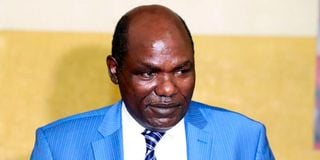Premium
2022 polls: Why all eyes are now on Wafula Chebukati

IEBC Chairman Wafula Chebukati.
Mr Wafula Wanyonyi Chebukati is a man with a thick skin and the proverbial nine lives.
Chairman of the Independent Electoral and Boundaries Commission has been in office since January 2017, when he succeed Mr Issack Hassan and immediately dived into the deep end overseeing the contentious elections of that year, which ended in ignominy after the historic Supreme Court annulment of the presidential election results.
As he gets set to supervise his second Presidential and General Election, Mr Chebukati can look back to have survived numerous ouster attempts and experienced the rough tumble of vicious infighting within the commission that has often exposed political leanings of commissioners and key staff.
He will also be acutely aware that if delivery of a free, fair, credible and verifiable election is key to post-election peace, then the future of Kenya lies squarely in his hands. He will recall that the annulled presidential election of 2017, followed by Mr Raila Odinga’s boycott of the repeat poll citing refusal of the electoral management body to cure the shortcomings identified by the Supreme Court, triggered a potentially destabilising situation.
President Kenyatta and Deputy President William Ruto were easily re-elected virtually unopposed at the repeat poll in October 2017. Mr Odinga went ahead to have himself sworn in as ‘Peoples’ President’ towards the end of January the following year, setting the stage for a protracted conflict that was only stilled when the two principal foes entered the famous ‘Handshake’ deal in March the same year.
That the country was spared post-election violence could have been due to providence, but memories still linger of the 2007 meltdown when an election bungled by the then electoral chief, Samuel Kivuitu, precipitated the most serious bloodshed in Kenya since independence.
Even the slightest possibility of a bungled election leading to violence is a burden that should be weighing heavily on Mr Chebukati’s shoulders, as well as the other electoral commissioners and senior secretariat staff.
That he is set to supervise his second General Election is testimony to Mr Chebukati’s resilience, but he has a lot to do in terms of addressing a great deal of scepticism across the board on election preparedness.
Over the last three election cycles, it has been the same story of a delayed procurement of election technology and materials, leading to late decisions on emergency procurement outside the normal safeguards, hasty installation and little time to train the users and test the systems.
Although the IEBC is exuding confidence that it is within the specified time frames, there are real concerns that it’s sailing too close to the wind and there will be little window to make amends if something goes wrong.
What Mr Chebukati at least has going for him is that the commission this time appears united with none of the infighting witnessed at the last elections. In 2017 the chairman, who had previously sought the Saboti parliamentary seat on an ODM ticket, seemed to enjoy the confidence of Mr Odinga’s campaign, while the IEBC chief executive and secretary, Mr Ezra Chiloba, seemed be in President Kenyatta’s corner.
After the botched polls of 2017, Mr Chebukati took just a few months to eject Mr Chiloba from IEBC following a series of ugly public spats. Then three commissioners who were sympathetic to Chiloba, vice chairperson Connie Maina, Ms Margaret Mwachanya and Dr Paul Kurgat, quit in protest. They were rewarded by State House with diplomatic postings.
The exits—following on the earlier departure of Dr Roselyn Akombe who fled the country ahead of the repeat presidential election—left the IEBC with a skeleton team of only Mr Chebukati and two others: Mr Abdi Guliye and Mr Boya Molu.
It wasn’t until last September that the agency was brought back to full complement with the appointment of Ms Juliana Cherera as vice-chairperson, Mr Francis Wanderi, Ms Irene Masit and Mr Justus Nyangaya. The vacant secretariat post was also filled with confirmation of Marjan Hussein Marjan, who had been acting since Mr Chiloba’s exit.
It has been quite placid at IEBC since then, unlike the tempestuous days of the Chebukati-Chiloba fights. That, however, does not mean that everything is going smoothly, and the IEBC still faces an acid test over deployment of polling technology and the assurances demanded by all interested parties that it is up to the task.





